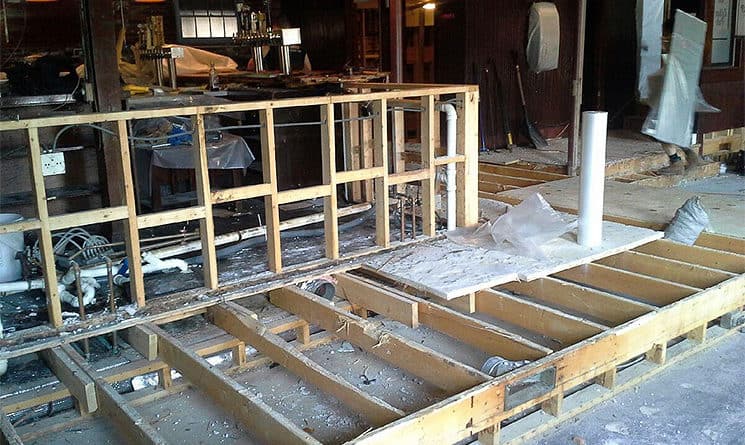When Jeff Roemer, owner of Blue Latitudes in Dover, got a call about a plumbing issue at the restaurant on Aug. 13 of last year, he expected to find a few gallons of dishwater from a clogged drain. When he arrived, he discovered something else entirely. Water from the city sewer system was “flowing like a torrent” through the lobby adjacent to his restaurant, he said.
Next door, Brian Kelley had gotten a similar call from the staff at Kelley’s Row. He figured it had something to do with the Cochecho River — the riverfront restaurant was no stranger to floods. But, when Kelley arrived, he found water erupting from the toilets and the drains in the kitchen.
Both restaurants closed immediately and tried to mitigate the damage. The first round of flooding lasted for almost two hours. “You could have dropped a kayak and gone for a ride,” Roemer said.
The situation at Kelley’s was just as hopeless. “We had ShopVacs out, but the amount of sewer water that was coming in was just ridiculous,” said Kelley. The second wave of flooding was even worse, because the water was black and filled with sediment. “That just added insult to injury,” said Kelley. “It was disgusting.”
It’s been five months since the two restaurants flooded. Both are making comebacks: Blue Latitudes reopened in October, and Kelley’s Row will reopen soon in a new location in Somersworth. However, Kelley and Roemer are still locked in a legal battle to recoup hundreds of thousands of dollars they lost following the flood.
Blue Latitudes in Dover. photo by Nate Hastings
The flood was traced to a major construction project on First Street. As part of the project, the city required the developers to reline a sewer main that runs under First Street to Cocheco Courtyard. To prepare for the relining, contractors set up a bypass to divert sewage away from the main. It rained heavily on Aug. 13, and the bypass couldn’t handle the load; everything downstream of the bypass backed up.
The flood was catastrophic for both restaurants. Anything the sewer water touched had to be disinfected or removed. Damages and lost revenue added up to hundreds of thousands of dollars in costs for the two businesses.
Blue Latitudes reopened in October with the help of a $100,000 insurance payout, Roemer’s own funds, and a $50,000 grant from Dover Main Street that must be repaid. Without that grant, Roemer said, the restaurant would not have reopened.
The damage at Kelley’s Row, however, was much worse, and the restaurant did not reopen. The water went under the bar area and into the HVAC system. Meanwhile, the repairs revealed other problems that needed to be fixed, such as a corroded natural gas pipe and electrical work that did not meet code. “It just didn’t end. The place was entirely gutted,” Kelley said.
“I would have been better covered if the place had blown up,” Roemer said. He recently changed insurance carriers and had $100,000 in coverage for sewer backups. When it came time to file insurance claims, the unusual circumstances of the flood worked against both restaurants. According to Roemer, businesses that serve food are required to carry insurance for sewer backups, but the amount of the coverage varies. Typically, a sewer backup is just an overflowing toilet; in a worst-case scenario, it would require replacing a bathroom, not an entire restaurant.
“I would have been better covered if the place had blown up.” — Jeff Roemer, owner of Blue Latitudes
While this was not enough to cover the damage at Blue Latitudes, it was four times the coverage Kelley’s Row had. Kelley did not consider the restaurant under-insured. In addition to the $25,000 for sewer backups, Kelley’s had hundreds of thousands of dollars in coverage for the interior contents and lost business. But the insurance company refused to pay anything beyond that $25,000, claiming the sewer backup triggered the rest of the losses. Kelley estimates he would have needed $325,000-$400,000 to reopen.
“It was an extremely big gamble for us, not knowing when or if we’ll ever get our money back,” Kelley said. Rather than continue to lose money, Kelley and his business partner closed the restaurant.
Roemer and the owners of Kelley’s Row are suing a number of different entities connected to the development, each with its own insurance company. Cocheco Mill, the building in which Blue Latitudes is located, has also joined the lawsuit.
“The judge said you have to narrow down who is really at fault,” Roemer said.
That could be difficult. An engineering analysis funded by the city found the sewer bypass caused the flood, and the attorneys are setting up an independent analysis as well. And then there are the potential conflicts of interest; most firms in the area have worked with at least one of the parties in the lawsuit.
“I’m not saying it’s one person,” said Kelley. “It could probably be two or three. We know one thing: somebody’s at fault. Someone did something wrong there that night.”
Roemer agreed. “Nobody wanted this to happen. Everybody sees that we were injured, and everyone expects that insurance will pay. But nobody’s written me a check yet,” he said.
Kelley hasn’t given up on the restaurant business. He has partnered with the owner of the former Sumner Country Restaurant, located on Route 108 in Somersworth, and plans to reopen the restaurant as Kelley’s Row in mid-March. Many of his longtime staff members have followed him there. It will be open in time for St. Patrick’s Day — he’s already booked the same Irish band that has played St. Patrick’s Day at Kelley’s for the past 15 years.
“This is in my blood,” Kelley said. “This is what I do. It’s what I’ve always done. I’ve never had any other type of job.”
At top of page: The interior of Kelley’s Row in Dover after it was damaged by flooding from a sewage backup.

